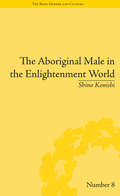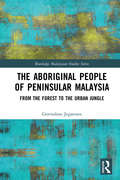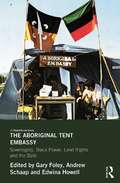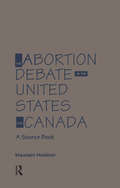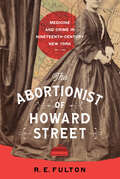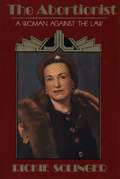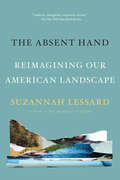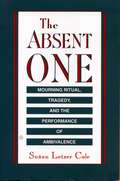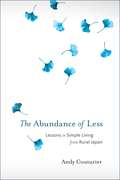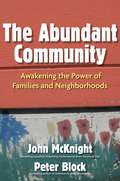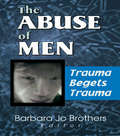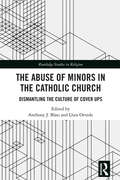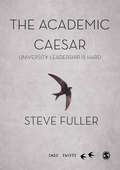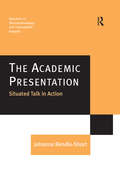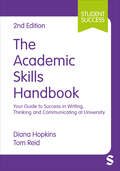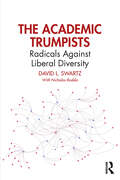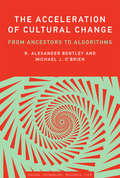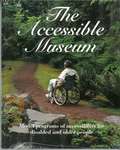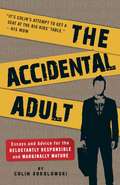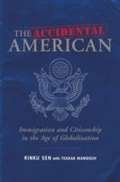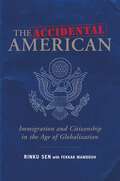- Table View
- List View
The Aboriginal Male in the Enlightenment World ("The Body, Gender and Culture" #8)
by Shino KonishiThis is the first historical study of indigenous Australian masculinity. Using the reactions of eighteenth-century western explorers to Aboriginal men, Konishi argues that these encounters were not as negative as has been thought.
The Aboriginal People of Peninsular Malaysia: From the Forest to the Urban Jungle (Routledge Malaysian Studies Series)
by Govindran JegatesenTo date, most studies of Malaysia’s aboriginal people, the Orang Asli, have studied the community in either the rural or forest settings. This book, however, outlines the dynamics of Orang Asli migration to Kuala Lumpur – Malaysia’s most urbanised region – and explores the lived experiences of these individuals in the urban space. The book begins by charting the history of the Orang Asli under British colonial rule followed by the community’s experiences under the Malaysian government, in an attempt to provide a deeper understanding of the economic and social complexities facing the Orang Asli today. Based on extensive original research, the book goes on to discuss the interesting changes taking place among urban Orang Asli migrants with regards to gender dynamics, while exploring the unique ways in which these urban indigenous migrants maintain close links with their home communities in the rural spaces of Peninsular Malaysia. The book concludes by assessing how research on the urban Orang Asli fits into broader studies of urban and contemporary indigeneity in both Malaysia and abroad.
The Aboriginal Tent Embassy: Sovereignty, Black Power, Land Rights and the State
by Gary Foley Andrew Schaap Edwina HowellThe 1972 Aboriginal Embassy was one of the most significant indigenous political demonstrations of the twentieth century. What began as a simple response to a Prime Ministerial statement on Australia Day 1972, evolved into a six-month political stand-off between radical Aboriginal activists and a conservative Australian government. The dramatic scenes in July 1972 when police forcibly removed the Embassy from the lawns of the Australian Houses of Parliament were transmitted around the world. The demonstration increased international awareness of the struggle for justice by Aboriginal people, brought an end to the national government policy of assimilation and put Aboriginal issues firmly onto the national political agenda. The Embassy remains today and on Australia Day 2012 was again the focal point for national and international attention, demonstrating the intensity that the Embassy can still provoke after forty years of just sitting there. If, as some suggest, the Embassy can only ever be removed by Aboriginal people achieving their goals of Land Rights, Self-Determination and economic independence then it is likely to remain for some time yet. ‘This book explores the context of this moment that captured the world’s attention by using, predominantly, the voices of the people who were there. More than a simple oral history, some of the key players represented here bring with them the imprimatur of the education they were to gain in the era after the Tent Embassy. This is an act of radicalisation. The Aboriginal participants in subversive political action have now broken through the barriers of access to academia and write as both eye-witnesses and also as trained historians, lawyers, film-makers. It is another act of subversion, a continuing taunt to the entrenched institutions of the dominant culture, part of a continuum of political thought and action.’ (Larissa Behrendt, Professor of Law, Jumbunna Indigenous House of Learning, University of Technology Sydney)
The Abortion Debate in the United States and Canada: A Source Book
by Maureen MuldoonFirst published in 1991. Over the last twenty-five years or so, the debate on abortion has not moved any closer to resolution in either the United States or Canada. The courts, the legislatures, the pulpits, the classrooms, the hospitals and clinics and the media have provided the forums for this on-going struggle. Two groups of activists have dominated the debate. The opponents of abortion, who are referred to as anti-abortion or pro-life, advocate restrictive policies on abortion while the pro-choice groups direct their attempts to creating a permissive policy that allows a woman to make her own decision. The anti-abortion advocates and the pro-choice advocates alike have learned the skills and developed the strategies to advance their own positions. Whatever legal and public policy gains are made by one side are often countered by moves from their opponents. There is available a vast amount of material related to the topic of abortion. From the extensive and diverse literature, this book draws a collection of relevant materials primarily representing aspects of the sociological, philosophical, religious and legal aspects of the abortion issue. Its purpose is to serve as a source bode for those interested in seeing how the abortion debate has been conducted within the recent past. The book also serves as a reference work for further study.
The Abortion Dilemma: Personal Views on a Public Dilemma
by Miriam ClaireUsing interviews, Miriam Claire writes about how people make choices about abortion.
The Abortion Myth
by Leslie Cannoldforges a new women-centered abortion ethic capable of preserving a woman's right to control her body and her freedom to choose/reject motherhood
The Abortionist of Howard Street: Medicine and Crime in Nineteenth-Century New York
by R.E. FultonJosephine McCarty had many identities. But in Albany, New York, she was known as "Dr. Emma Burleigh," the abortionist of Howard Street.On January 17, 1872, McCarty boarded a streetcar in Utica, New York, shot her ex-lover in the face, and disembarked, unaware that her bullet had passed through her target's head and into the heart of the innocent man sitting beside him. The unlucky passenger died within minutes. Josephine McCarty was arrested for attempted murder and quickly became the most notorious woman in central New York. The Abortionist of Howard Street was, however, far more than a murderer. In Maryland she was "Johnny McCarty," a blockade runner and spy for Confederate forces. New Yorkers whispered of her as a mistress to corrupt Albany politicians. So who was she?The prosecution in her murder trial claimed she was a calculating and heartless operative both in the bedroom and in her public life. Or was she the victim of ill fortune and the systemic weight of misogyny and male violence? The answer, of course, was not as simple as either narrative. In this absorbing and rich history, R.E. Fulton considers the nuances of Josephine McCarty's life from marriage to divorce, from financial abuse to quarrels with intimate partners and more, trying to decipher the truth behind the stories and myths surrounding McCarty and what ultimately led her to that Utica streetcar with a pistol in her dress pocket. In The Abortionist of Howard Street, Fulton revisites a rich history of women's experience in mid-nineteenth century America, revealing McCarty as a multifaceted, fascinating personification of issues as broad as reproductive health, education, domestic abuse, mental illness, and criminal justice.
The Abortionist: A Woman Against the Law
by Rickie SolingerPrior to Roe v. Wade, hundreds of thousands of illegal abortions occurred in the United States every year. Rickie Solinger uses the story of Ruth Barnett, an abortionist in Portland, Oregon, between 1918 and 1968 to demonstrate that it was the law, not so-called back-alley practitioners, that most endangered women's lives in the years before abortion was legal. Women from all walks of life came to Ruth Barnett to seek abortions. For most of her career she worked in a proper suite of offices, undisturbed by legal authorities. In her years of practice she performed forty thousand abortions and never lost a patient. But in the anti-abortion fervor of the post-World War II era, conditions in Portland and elsewhere began to change. Barnett and other practitioners were hounded by the police and became convenient targets for politicians and sensation-hungry journalists. Desperate women continued to seek abortions but were forced to turn to profiteering abortion syndicates run by racketeers or to use self-induced methods that often ended in serious injury or death. Solinger makes vivid use of newspaper accounts and extant legal transcripts to document how throughout the country laws were used to persecute competent abortion practitioners. While Roe v. Wade has alleviated some of the danger that shaped women's lives before 1973, Solinger points out that the abortion practitioner is again threatened in the United States, this time by the violence of anti-choice fanatics. Her book is an instructive reminder of the vigilance necessary to protect both women and those who would provide them with freedom of choice.
The Absent Hand: Reimagining Our American Landscape
by Suzannah Lessard"Of beach plums, ramps, and Ramada Inns: a quietly sensitive eminently sensible consideration of the landscapes of our lives . . . A gift." —Kirkus ReviewsFollowing her bestselling The Architect of Desire, Suzannah Lessard returns with a remarkable book, a work of relentless curiosity and a graceful mixture of observation and philosophy. This intriguing hybrid will remind some of W. G. Sebald’s work and others of Rebecca Solnit’s, but it is Lessard’s singular talent to combine this profound book–length mosaic— a blend of historical travelogue, reportorial probing, philosophical meditation, and prose poem—into a work of unique genius, as she describes and reimagines our landscapes. In this exploration of our surroundings, The Absent Hand contends that to reimagine landscape is a form of cultural reinvention. This engrossing work of literary nonfiction is a deep dive into our surroundings—cities, countryside, and sprawl—exploring change in the meaning of place and reimagining the world in a time of transition. Whether it be climate change altering the meaning of nature, or digital communications altering the nature of work, the effects of global enclosure on the meaning of place are panoramic, infiltrative, inescapable. No one will finish this book, this journey, without having their ideas of living and settling in their surroundings profoundly enriched.
The Absent One: Mourning Ritual, Tragedy, and the Performance of Ambivalence
by Susan L. ColeHere is presented a new theory of the origins of tragedy, based on its perceived kinship with mourning ritual. Mourners and tragic protagonists alike journey through dangerous transitional states, confront the uncanny, express themselves in antithetical style, and, above all, enact their ambivalence toward their beloved dead. Elements common to both tragedy and mourning ritual are first identified in actual Chinese, African, and Greek funerary rites and then analyzed in tragedies by Aeschylus, Sophocles, Shakespeare, Racine, Ibsen, O'Neill, Miller, Beckett, and Ionesco. Included is a firsthand account of exploration of the tragedy-mourning link in the rehearsal process of the great experimental theater director, Joseph Chaikin. Opening her first chapter, Dr. Cole says, "The grave is the birthplace of tragic drama and ghosts are its procreators. For tragedy is the performance of ambivalence which ghosts emblematize: what we fear in particular--the revenant, the ghost returning to haunt us--is also what we desire--the extending of life beyond the moment of death. "
The Abundance of Less: Lessons in Simple Living from Rural Japan
by Andy CouturierAndy Couturier captures the texture of sustainable lives well lived in these ten profiles of ordinary—yet exceptional—men and women who left behind mainstream existences in urban Japan to live surrounded by the luxuries of nature, art, friends, delicious food, and an abundance of time. Drawing on traditional Eastern spiritual wisdom and culture, these pioneers describe the profound personal transformations they underwent as they escaped the stress, consumerism, busyness, and dependence on technology of modern life. This intimate and evocative book tells of their fulfilling lives as artists, philosophers, and farmers who rely on themselves for happiness and sustenance. By inviting readers to enter into the essence of these individuals’ days, Couturier shows us how we too can bring more meaning and richness to our own lives.
The Abundant Community: Awakening the Power of Families and Neighborhoods
by Peter Block John McknightThere is a growing movement of people with a different vision for their local communities. They know that real satisfaction and the good life are not provided by organizations, institutions, or systems. No numbers of great CEOs, central offices, or long range plans produce what a community can produce. People are discovering a new possibility for their lives. They have a calling. They are called. And together they call upon themselves. This possibility is idealistic, and yet it is an ideal within our grasp. It is a possibility that is both idealistic and realistic. Our culture leads us to believe that a satisfying life can be purchased. It tells us that in the place where we live, we don't have the resources to create a good life. This book reminds us that a neighborhood that can raise a child, provide security, sustain our health, secure our income, and care for our vulnerable people is within the power of our community. This book gives voice to our ideal of a beloved community. It reminds us of our power to create a hope-filled life. It assures us that when we join together with our neighbors we are the architects of the future where we want to live.
The Abuse of Men: Trauma Begets Trauma
by Barbara Jo BrothersWhen men are abused, everybody suffers. This courageous book exposes a dark secret: Men are often victims of abuse. Although a great deal of attention has recently been paid to the victimization of women, the role of men as victims--not just perpetrators--has been neglected. The Abuse of Men reveals the impact of physical, sexual, and emotional trauma on the lives and relationships of men. This groundbreaking book shows how the negative effects of both basic training and combat may also cause lasting damage to men's self-esteem, ability to trust, personal boundaries, and ability to form healthy relationships. The Abuse of Men explores the prevalence of other kinds of violence and abuse toward men and boys, from child-battering to spousal abuse. It also discusses how the culture of violence and societal expectations of boys and men can help drive victims of abuse toward continuing the cycle of violence. The Abuse of Men discusses the sources of trauma, including: the quality and quantity of domestic violence committed by women against men the role of abusive fathers in raising sons who become abusers vicarious traumatization from living with partners whose uncontrolled PTSD makes them dangerously abusive hazing, military training, and other socially sanctioned male-on-male violence trauma contagion and transactional victimizingThe Abuse of Men also offers specific suggestions for therapists working with abused men and their partners, including an innovative step-by-step program for treating couples who have both been traumatized. By understanding how men and boys become victims and respond to trauma, you can help heal their pain and teach them to build positive, loving relationships.
The Abuse of Minors in the Catholic Church: Dismantling the Culture of Cover Ups (Routledge Studies in Religion)
by Lluis Oviedo Anthony J. BlasiThis book offers an academically rigorous examination of the biological, psychological, social and ecclesiastical processes that allowed sexual abuse in the Catholic Church to happen and then be covered up. The collected essays provide a means to better assess systemic wrongdoing in religious institutions, so that they can be more effectively held to account. An international team of contributors apply a necessarily multi-disciplinary approach to this difficult subject. Chapters look closely at the sexual abuse of minors by Roman Catholic clerics, explaining the complexity of this issue, which cannot be reduced to simple misconduct, sexual deviation, or a management failure alone. The book will help the reader to better understand the social, organizational, and cultural processes in the Church over recent decades, as well as the intricate world of beliefs, moral rules, and behaviours. It concludes with some strategies for change at the individual and corporate levels that will better ensure safeguarding within the Catholic Church and its affiliate institutions. This multifaceted study gives a nuanced analysis of this huge organizational failure and offers recommendations for effective ways of preventing it in the future. As such, it will be of keen interest to scholars of Religious Studies, Sociology of Religion, Psychology, Psychiatry, Legal Studies, Ethics, Anthropology, Cultural Studies, History, and Theology.
The Academic Caesar: University Leadership is Hard (SAGE Swifts)
by Steve FullerAimed directly at those who aspire to be university leaders in these turbulent times, and written as an academic counterpart to Machiavelli's The Prince, The Academic Caesar explores four themes that are central to the contemporary university: its Caesar-leaders, its economics, its disciplines, and whether academics have a future in the universities. Drawing on a wealth of experience writing about the social epistemology of higher education, Steve Fuller makes a witty, robust and provocative contribution to the ongoing debate about where the university has come from and where it is going. The Academic Caesar will prove a fascinating read for those seeking new insights into current crisis in higher education as well as researchers and academics interested in the sociology of leadership.
The Academic Caesar: University Leadership is Hard (SAGE Swifts)
by Steve FullerAimed directly at those who aspire to be university leaders in these turbulent times, and written as an academic counterpart to Machiavelli's The Prince, The Academic Caesar explores four themes that are central to the contemporary university: its Caesar-leaders, its economics, its disciplines, and whether academics have a future in the universities. Drawing on a wealth of experience writing about the social epistemology of higher education, Steve Fuller makes a witty, robust and provocative contribution to the ongoing debate about where the university has come from and where it is going. The Academic Caesar will prove a fascinating read for those seeking new insights into current crisis in higher education as well as researchers and academics interested in the sociology of leadership.
The Academic Presentation: Situated Talk in Action (Directions in Ethnomethodology and Conversation Analysis)
by Johanna Rendle-ShortHow is the task of giving a presentation accomplished? In this insightful book Johanna Rendle-Short unpacks this seemingly simple task to show the complexity that underlies it. Examining the academic presentation as a case in point, she details how seminar presenters interact with the audience and objects around them to produce a coherent whole. Through detailed examination of talk-in-interaction the book throws light on one instance of talk as situated practice, demonstrating both the ordinariness of the academic presentation, and its intricate complexity. While audience members recognize that a seminar is underway, this book shows how this recognition comes about. The Academic Presentation will greatly interest scholars of talk and interaction analysis, situated talk, ethnomethodology and conversation analysis.
The Academic Skills Handbook: Your Guide to Success in Writing, Thinking and Communicating at University (Student Success)
by Diana Hopkins Tom ReidThis is your complete guide to success in navigating, writing, thinking, and communicating at university. Packed with tips, diagnostic tools, guided exercises, and full text examples, it equips you to boost your grades, ace your assignments, and get the most out of your time at university. This book helps you: Prepare for and navigate university culture Develop the academic skills needed for success at university Communicate your ideas with confidence and clarity Watch your skills grow with diagnostic tools Create your own study plan tailored to the skills you need Know what your tutor is looking for and how to deliver Turn your skills into success after university The Academic Skills Handbook is specially designed to show you where your strengths are and what you need to work on, so you get a practice plan that is perfect for your needs. It then arms you with the principles and practice to get ahead in your academic writing, presentations and group work. What′s new to this edition? Three chapters on university culture, writing blogs, and online and blended learning (including best practices for using AI as a support tool), as well as new annotated examples of course work and increased coverage of wellbeing. Student Success is a series of essential guides for students of all levels. From how to think critically and write great essays to boosting your employability and managing your wellbeing, the Student Success series helps you study smarter and get the best from your time at university.
The Academic Skills Handbook: Your Guide to Success in Writing, Thinking and Communicating at University (Student Success)
by Diana Hopkins Tom ReidThis is your complete guide to success in navigating, writing, thinking, and communicating at university. Packed with tips, diagnostic tools, guided exercises, and full text examples, it equips you to boost your grades, ace your assignments, and get the most out of your time at university. This book helps you: Prepare for and navigate university culture Develop the academic skills needed for success at university Communicate your ideas with confidence and clarity Watch your skills grow with diagnostic tools Create your own study plan tailored to the skills you need Know what your tutor is looking for and how to deliver Turn your skills into success after university The Academic Skills Handbook is specially designed to show you where your strengths are and what you need to work on, so you get a practice plan that is perfect for your needs. It then arms you with the principles and practice to get ahead in your academic writing, presentations and group work. What′s new to this edition? Three chapters on university culture, writing blogs, and online and blended learning (including best practices for using AI as a support tool), as well as new annotated examples of course work and increased coverage of wellbeing. Student Success is a series of essential guides for students of all levels. From how to think critically and write great essays to boosting your employability and managing your wellbeing, the Student Success series helps you study smarter and get the best from your time at university.
The Academic Trumpists: Radicals Against Liberal Diversity
by David L. SwartzThere has been an outpouring of research on populist conservatism since the advent of the Trump presidency and extreme right movements in Europe. Much less studied, however, is the growing political conservatism in the American academy and how it relates to populist sentiment. The Academic Trumpists addresses a gap in the research literature by looking at the impact of Trumpism on conservative faculty. It compares 109 professors who publicly support Trump to 89 conservative professors who oppose Trump. All 198 function as public intellectuals who advocated publicly their views.Drawing on recent research in the sociology of intellectuals and Pierre Bourdieu’s analytical field perspective, this book offers a fielding political identities and practices framework to show how these two groups of professors (Trumpists and anti-Trumpists) differ in where they teach, their intellectual orientations, their scholarly productivity, their political rationales, where they network with think tanks, scholarly professional associations, and government agencies, and their stances on key controversies surrounding the Trump presidency (Covid-19, the two impeachments, the November 2020 election lost, and the January 6 mob assault on the United States Capitol). The academic Trumpists embrace the right-wing populist wave mobilized by Trump and the conservative critics resist this move. This polarization of views between these two groups of conservative professors is enduring and rooted in two distinct social networks that connect their positions in the academic field to affiliations with conservative think tanks that reinforce their respective political identities and radical right-wing anti-establishment thinking in America more generally.This book will appeal to readers interested in the politics of higher education, the sociology of intellectuals, political sociology, and research on conservative and right-wing populism politics in America today.
The Acceleration of Cultural Change: From Ancestors to Algorithms (Simplicity: Design, Technology, Business, Life)
by Michael J. O'Brien R. Alexander BentleyHow culture evolves through algorithms rather than knowledge inherited from ancestors. From our hunter-gatherer days, we humans evolved to be excellent throwers, chewers, and long-distance runners. We are highly social, crave Paleolithic snacks, and display some gendered difference resulting from mate selection. But we now find ourselves binge-viewing, texting while driving, and playing Minecraft. Only the collective acceleration of cultural and technological evolution explains this development. The evolutionary psychology of individuals—the drive for “food and sex”—explains some of our current habits, but our evolutionary success, Alex Bentley and Mike O'Brien explain, lies in our ability to learn cultural know-how and to teach it to the next generation. Today, we are following social media bots as much as we are learning from our ancestors. We are radically changing the way culture evolves.Bentley and O'Brien describe how the transmission of culture has become vast and instantaneous across an Internet of people and devices, after millennia of local ancestral knowledge that evolved slowly. Long-evolved cultural knowledge is aggressively discounted by online algorithms, which prioritize popularity and recency. If children are learning more from Minecraft than from tradition, this is a profound shift in cultural evolution. Bentley and O'Brien examine the broad and shallow model of cultural evolution seen today in the science of networks, prediction markets, and the explosion of digital information. They suggest that in the future, artificial intelligence could be put to work to solve the problem of information overload, learning to integrate concepts over the vast idea space of digitally stored information.
The Accessible Museum Model Programs of Accessibility for Disabled and Older People
by American Association of MuseumsA very interesting guide to museums of all kinds, which cater to accessibility for disabled and older people.
The Accidental Adult: Essays and Advice for the Reluctantly Responsible and Marginally Mature
by Colin SokolowskiAccidental Adult (n.): an individual whose age indicates maturity, but whose actions indicate otherwise.Those carefree days of post-college life went away in the blink of an eye. Now you spend your money on mortgage payments and Saturdays at dance recitals. The mixtapes you blasted out of your two-door coupe went the same way as the car, traded in--for a sliding-door minivan with a complimentary Wiggles CD.If life's the ultimate road trip, it's time to stop listening to the GPS of responsible adulthood. Instead, follow the lead of reluctant grown-up Colin Sokolowski, who proves growing up doesn't necessarily mean selling out. With a little guidance, you can survive the inevitable trek to old age as an accidental adult and have some fun along the way.Part how-to advice and part how-not-to narrative, The Accidental Adult leads you along an alternate path through adulthood. You'll learn there's a time and a place to act your age (ditch the Coors Light during dinner parties), but that you don't have to lose your sense of cool (it's okay to buy those $250 reunion tour tickets--as long as your car payment's in). With it, you'll realize that just because you're older doesn't mean you have to be lamer.
The Accidental American: Immigration and Citizenship in the Age of Globalization
by Rinku Sen Fekkak MamdouhThe Accidental American vividly illustrates the challenges and contradictions of U. S. immigration policy, and argues that, just as there is a free flow of capital in the world economy, there should be a free flow of labor.
The Accidental American: Immigration and Citizenship in the Age of Globalization
by Rinku Sen Fekkak MamdouhThe Accidental American advocates a bold new approach to immigration: a free international flow of labor to match globalization’s free flow of capital. After all, corporations are encouraged to move anywhere in the world they can maximize their earnings. People shouldn’t have to risk exploitation, abuse, even imprisonment when they try to do the same. Activist, journalist, and immigration expert Rinku Sen and organizer Fekkak Mamdouh examine the consequences of this injustice through Mamdouh’s own story. Born in Morocco, he was a waiter and union leader at Windows on the World, a restaurant in the World Trade Center, on September 11th. In the aftermath, facing a rising tide of anti-immigrant bias, Mamdouh and others formed the Restaurant Opportunities Center of New York to help their colleagues fight for decent jobs and fair treatment. The experiences of Mamdouh and his coworkers vividly demonstrate the human cost of our flawed immigration policies. Since September 11th, immigrants have increasingly been treated as presumptive criminals. As a counterpoint to these regressive, fundamentally un-American practices, Sen forcefully advocates more humane policies, coupled with proposals for reforming globalization so that all countries can more equitably benefit from a mobile labor force.
